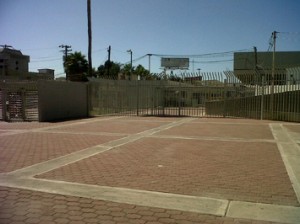Deportation to Shattered DREAMs: Friendship Has No Borders
By Nancy Landa
MundoCitizen
(Editor’s note: DREAMer Nancy Landa’s first-hand experience of removal proceedings by US Citizens and Immigration Services (USCIS))

I set foot on American soil as I got off the bus which had arrived at the San Ysidro-Tijuana border. U.S. Immigration officers were standing ready to hand over to each of us a small brown bag tagged with a label imprinted with our names. When I opened mine, I notice that it contained my belongings I had with me when detained: my purse with just a cell phone and a small amount of cash I was carrying for the day.
I was then escorted by the U.S. agent to a gate where a Mexican immigration officer was waiting. He asked me a few questions to verify if I was Mexican. But with no ID to prove I was one and with a spoken Spanish that seemed to be foreign, I was concerned the immigration officer would doubt my nationality.
I was now only a deportee with no identity. I tried to keep myself calm as I answered each question. After withstanding the suspicious stare of the officer, he decided to let me pass.
It was past 8 pm and I was on my own. With no time to reflect that it was my last moment on the side of the border that had been home to me for almost 20 years, I walked toward the first revolving door that welcomed me to Mexico. But unlike most tourists that pass through these gates on a daily basis, perhaps with a sense of exploration of what they expect to be a sightseeing adventure, I was beginning a fight for survival in unknown territory, with no family or friends living here whom I could call for help. I began to doubt whether I could endure the danger that was present in a town recently plagued by an outbreak of violence.
I continued to walk down the corridor and noticed about 50 meters away was a second gate which I presumed was signaling the end of this transitory space. I was not yet ready to cross this gate, as I felt somewhat protected here. I needed some time to figure out where to go next.
I noticed that some of the deportees that were on the same bus with me were forming a line at a small bungalow closer to the first gate I had exited. The sign above the entrance read Grupo Beta. After a brief conversation with some of the people waiting in line, I learned that this organization provides protection to migrants. One of their services available was a free phone call for each deportee so they could reach their family members.
As I get in line, I remembered I was carrying my cell phone but was unsure if I could use it for calls. I then make a test phone call to one of my friends, and to my surprise it goes through!
In a brief conversation, she informed me that three of my friends were driving to Tijuana to find me and ensure I was in a safe place to stay.
At that very moment, I realized one thing: Friendship Has No Borders.
Despite having a physical wall separating me indefinitely from the world I had known, my friends were there for me and were unwilling to let me face this situation alone.
Although many challenges laid ahead as a result of an abrupt deportation, I knew I was blessed to have a community of friends that did everything they could to help in the transition. For at least a week, I had food and shelter in a relatively safe environment as I figured out how to get my feet off the ground.
Unfortunately, I cannot say that the hundreds of individuals that get thrown out on a daily basis through the same border I crossed, will have the same luck. Sadly, this type of safeguard I received is not institutionalized by neither U.S. or Mexican authorities. Both play a role in a system of detention and deportation that, if scrutinized carefully, can hardly be perceived to follow due process or international standards of humane treatment that they have agreed to comply with.
In the meantime, we continue to have an exodus of hundreds of deportees on a daily basis, trying to figure out how to survive this night.
Nancy Landa is a deported honors graduate and former student President of California State University, Northridge (CSUN). Nancy resides in Tijuana since her deportation in 2009 and has shared her story to highlight the need for comprehensive immigration reform in the U.S. You can follow Nancy on Facebook and Twitter @mundocitizen.


 Arturo Castañares
Arturo Castañares





